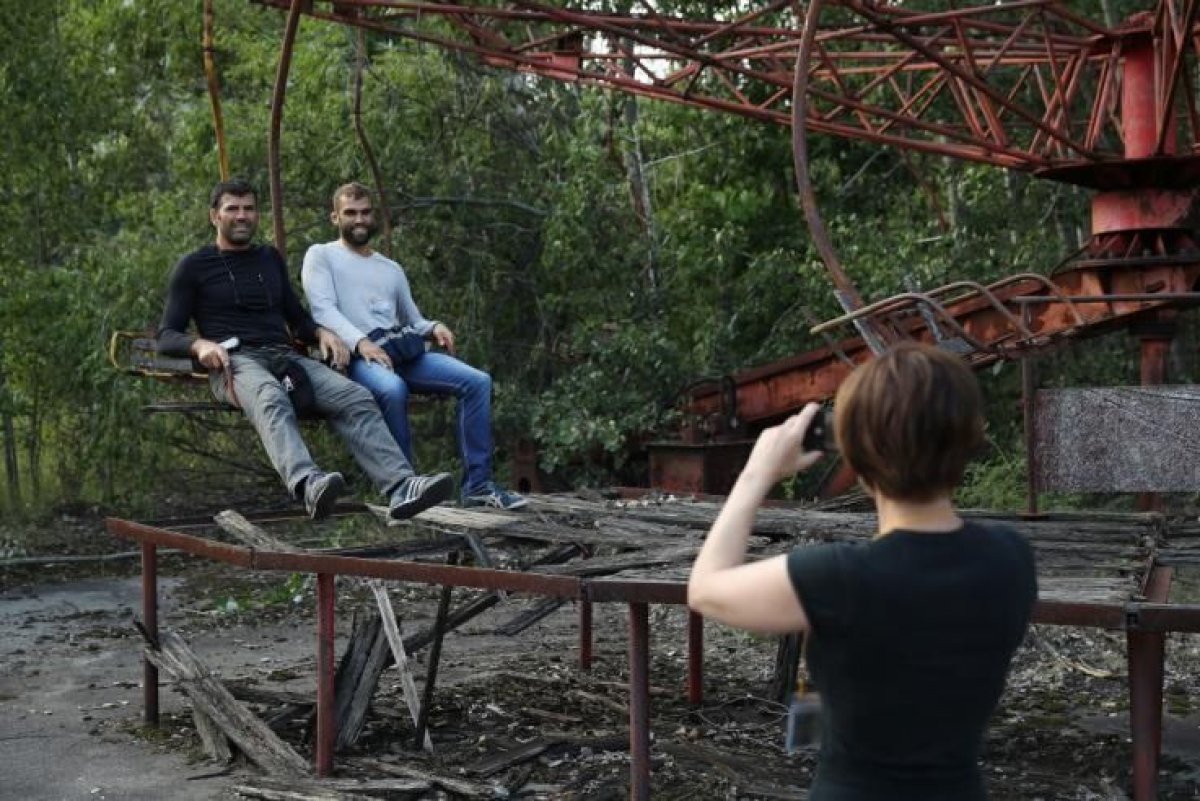The causes behind the Chernobyl disaster were both rare and complicated, making it a perfect breeding ground for conspiracy theories. Many of the rumors and conspiracies that popped up in the wake of the reactor meltdown are remarkably similar to the flavors of paranoia and conspiracism surrounding more contemporary traumas in the United States.
Reactor No. 4 of the Chernobyl Nuclear Power Station went critical early in the morning of April 26, 1986, after a systems test went awry, causing two explosions in quick succession. The first destroyed the reactor casing, blowing the upper plating through the plant's ceiling. A few seconds later, a second explosion blew apart the core, ending the fission reaction within, but spreading fallout and contaminated metals in and around the reactor building. Radiation levels spiked, high enough in some areas to impart a lethal dose within seconds.
At the time of the explosion, the town of Pripyat, built for Chernobyl workers and their families, housed 49,000 people. The resulting death toll is disputed, but U.N. agencies arrived at 4,000 deaths related to radiation exposure. Other investigations have connected thousands of additional cancer deaths to the Chernobyl disaster.
The scale of the evacuation, combined with the Soviet government's efforts to keep the disaster quiet—the wider world was only alerted two days after, when radiation alarms went off at a nuclear power station in Sweden—resulted in conflicting information and wildfire rumors in the absence of clear communications. It took years and multiple reports to untangle the causes of the disaster, which came down to insufficient safety standards and design flaws, particularly in the control rods meant to tamp down chain reactions within the reactor. But small technical answers are unsatisfying when stacked against the scale of trauma and destruction.
Into this explanatory void, conspiracy theories erupted. In Voices from Chernobyl: The Oral History of a Nuclear Disaster, winner of the National Book Critics Circle Award, Svetlana Alexievich captured the oral history of the Chernobyl disaster's aftermath, including a catalog of rumors and conspiracy theories recorded by Alexievich's fellow journalist, Anatoly Shimanskiy.
Chernobyl Radiation Rumors

Since Soviet authorities kept tight control of information coming out of the Chernobyl exclusion zone, rumors about the effects of radiation began to blossom. Stories spread about the grotesque mutations supposedly caused by the radiation, like descriptions of pike floating around local lakes without heads or tails.
But more elaborate conspiracy theories alleged government foreknowledge and sinister experimentation after the fact, both staples of American conspiracy theories as well. Many shared suspicions with Shimanskiy that the government knew the Chernobyl explosion was going to happen, similar to the conspiracy theories surrounding the 9/11 attacks.
"It wasn't an accident, it was an earthquake. Something happened to the earth's core," Shimanskiy relays in Voices from Chernobyl. "Geophysical and cosmophysical forces were at work. The military knew about it beforehand, they could have warned people, but it's all very strictly kept secret there."
The U.S. also sees theories spread about imagined FEMA camps and the "true" reasons for military drills like 2015's Jade Helm. Their Chernobyl counterparts involved suspicion of government efforts during the ensuing cleanup of radioactive material (often with good cause).
"There are camps behind Chernobyl where they're going to place those who received heavy doses of radiation. They'll keep them there a while, observe them, then bury them," one rumor held. Others believed that residents of towns affected by the fallout would be shipped to Siberia and forced to live in labor camp barracks still standing from Joseph Stalin's rule.
Chernobyl Disaster and UFOs

Most conspiracy theories inevitably expand to include extraterrestrials—those surrounding the Chernobyl disaster were no exception. Several people claimed, after the fact, to have seen flying saucers hovering over the power station in the hours before the explosion. Since UFOs are often paired with government cover-ups, Shimanskiy soon heard rumors of "a cosmic experiment being performed on us."
"The Chernobylites are giving birth to children who have an unknown yellow fluid instead of blood," Shimanskiy describes to Alexievich. "Children born in three or four generations will be Einsteins."
The real aftermath of the reactor meltdown at Chernobyl nuclear power station was shocking enough, prompting serious concerns with the Soviet Union's approach to nuclear power, and conspiracy theories could provide easy to understand narratives and meaning to accidents. While the shape of conspiracy theories are specific to cultures, time periods and events—nothing resulting from Chernobyl is quite like QAnon—the rumors sprung forth from the Chernobyl disaster show how conspiracism often takes similar forms, whether in the United States, or in Ukraine.
Uncommon Knowledge
Newsweek is committed to challenging conventional wisdom and finding connections in the search for common ground.
Newsweek is committed to challenging conventional wisdom and finding connections in the search for common ground.
About the writer
To read how Newsweek uses AI as a newsroom tool, Click here.








